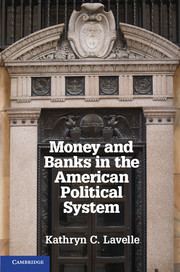Book contents
- Frontmatter
- Contents
- Figures and Tables
- Preface
- Acknowledgments
- Abbreviations
- 1 The Institutional Foundations of Financial Politics in the United States
- Section 1 A Historical Background
- Section 2 Bureaucratic Politics and Finance
- Section 3 The Operation of the Financial Political Economy
- 7 The Process in Motion
- 8 The Process Approaches Collapse
- 9 The Process in Its International Context
- Section 4 Conclusions
- Glossary
- References
- Index
- References
8 - The Process Approaches Collapse
Politics in the Financial Crisis of 2008
Published online by Cambridge University Press: 05 January 2013
- Frontmatter
- Contents
- Figures and Tables
- Preface
- Acknowledgments
- Abbreviations
- 1 The Institutional Foundations of Financial Politics in the United States
- Section 1 A Historical Background
- Section 2 Bureaucratic Politics and Finance
- Section 3 The Operation of the Financial Political Economy
- 7 The Process in Motion
- 8 The Process Approaches Collapse
- 9 The Process in Its International Context
- Section 4 Conclusions
- Glossary
- References
- Index
- References
Summary
Unlike the response to a downturn in the business cycle that unfolds over months or years, the government's response to a financial crisis must be immediate to prevent a collapse of the entire system. No doubt, many people are hurt in an economic downturn. However, should a catastrophic failure in the banking system occur, individuals would lose access to their savings and retirement accounts, businesses would not be able to make payments or be paid by their customers, and the government would not be able to conduct its affairs. The aftereffects of policies implemented in a crisis are also more profound than those taken during the ordinary course of the business cycle. A crisis changes the margins around the legitimate use of government action. As a result, the government's response leads to the creation of new institutions, new powers for existing agencies, and new precedents for the future. Hence, this chapter considers the crisis of 2008 to situate it within patterns of conduct of American government in response to crises since the end of the Civil War. Although economic assessments have demonstrated that the excessive accumulation of debt is a common theme in the buildup to a range of financial crises, a particular institutional arrangement and political culture allow them to occur in the United States.
Therefore, rather than providing the type of exhaustive review of the financial crisis of 2008 and government bailouts that are available from other excellent sources, we will explore the politics of the financial system by placing the events against the backdrop of the congressional calendar and bureaucratic politics more broadly. This chapter divides the events and the government's response to them into their immediate and medium-term phases. Each resulted in the passage of a major piece of legislation: one that forced a degree of democratic accountability on the government for the rescue, and another that altered the governing authority among agencies of the federal government and created a new one.
- Type
- Chapter
- Information
- Money and Banks in the American Political System , pp. 187 - 218Publisher: Cambridge University PressPrint publication year: 2013



